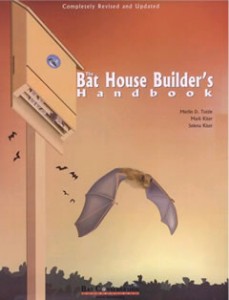-
Bat House Myths Dispelled
Control insect populations naturally with a bat house.
Adding a bat house for shelter to tiny brown bats is a wisely ecological choice. The bats have earned a bad rap as the winged symbol of Halloween, blood and vampires…This is the biggest misconception, as bats can be man’s best friend during the buggy, summer months.
Bats pollinate fruit as well as taking care of pesky insects that make our lives miserable during summer. They’re able to wipe out thousands of blood-sucking mosquitoes in one night’s feeding. Farmers have known the advantages to keeping bat populations, in order to keep crops bug-free.
So next time you reach for an insecticide to rid the yard of unwanted pests, think about installing a bat house instead!
-
A Bat House Builder’s Book
Providing homes for bats is mostly beneficial as natural pest control. Bat conservation groups have been growing in popularity, as these little guys are pretty good neighbors to have around. You need not spend a fortune on a bat house. Smaller wooden houses are comparable to your basic nest box. However, there are the deluxe models for accommodating whole colonies too.
You may want to try building your own bat house if you’re so inclined. Many plans are available on the internet, some are even offered free by bat conservation groups. Bat habitat has become a front row player among birding accessories, as several reputable companies now manufacture recycled plastic bat houses that are guaranteed to last a lifetime!
-
Add a Bat House for Natural Insect Control
Instead of pesticides and nasty chemicals, it’s wise to opt for natural insect control in any environment. By erecting a bat house, you’ll provide proper shelter for these little, harmless, and most beneficial species…the brown bat.
Houses should be mounted 15 to 20 feet above ground, on a tree, pole or other structure. Most bat houses are cedar, but newer recycled models are also available. And like most wildlife homes, these houses range from very basic, to more decorative designs.
For more information on bats, you can visit the Organization for Bat Conservation at http://www.batconservation.org



 Instead of pesticides and nasty chemicals, it’s wise to opt for natural insect control in any environment. By erecting a
Instead of pesticides and nasty chemicals, it’s wise to opt for natural insect control in any environment. By erecting a